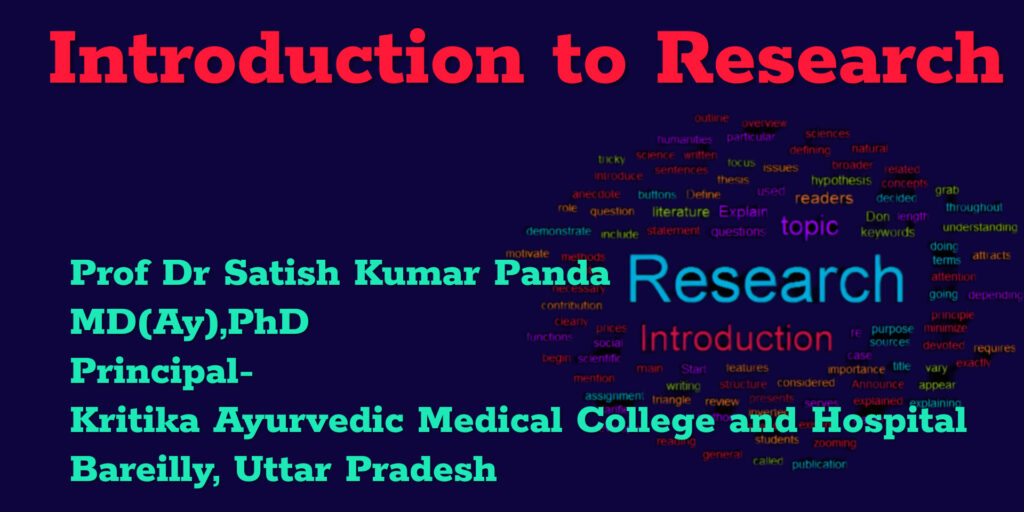
CHAPTER II: INTRODUCTION TO RESEARCH
Etymology
- The word “Research” comes from the Old French word recerchier (to search), later becoming recherche/rechercher.
- First recorded use: 1577.
- “Research” is composed of two parts:
- “Re” – a prefix meaning again, anew, or over again.
- “Search” – a verb meaning to examine closely and carefully, to test, to probe.
Definitions
- Oxford Advanced Learner’s Dictionary:
“A careful investigation or inquiry especially through search for new facts in any branch of knowledge.” - Merriam-Webster Dictionary:
“A studious inquiry or examination; especially investigation or experimentation aimed at discovery and interpretation of facts, revision of accepted theories or laws in light of new facts, or practical application of such new or revised theories or laws.” - Clarke and Clarke:
“Research is a careful, systematic, and objective investigation conducted to obtain valid facts, draw conclusions, and establish principles regarding an identifiable problem in some field of knowledge.”
Synonyms of Research
- As a noun:
Investigation, Experimentation, Testing, Exploration, Analysis, Fact-finding, Examination, Scrutiny, Probing - As a verb:
Investigate, Conduct, Study, Enquire into, Probe, Explore, Analyze, Examine, Scrutinize, Inspect, Review, Assess, Read
Biomedical / Medical Research
- Also known as Biomedical Research or Experimental Medicine.
- Encompasses:
- Basic Research (bench science): Involves fundamental scientific principles for pre-clinical understanding.
- Clinical Research: Involves studies on human subjects, often in clinical trials.
- Applied/Translational Research: Expands medical knowledge for practical application.
Objectives of Research
Research aims to:
- Discover new facts.
- Verify and test important theories.
- Analyze phenomena to understand cause-effect relationships.
- Develop new scientific tools, concepts, and theories.
- Solve scientific, non-scientific, and social problems.
Purpose of Research
Research generally serves four purposes:
- Describing & Explaining
- To understand and interpret the world.
- To establish facts and develop methods.
- Prediction
- Stating hypotheses—clear, testable statements.
- Subjected to scientific verification or refutation.
- Control
- Applying verified knowledge to real-world problems.
- Helps shape and improve environments and outcomes.
Acronym of RESEARCH (Characteristics of Ideal Research)
R – Review of Literature
E – Economical
S – Scientific and Specific
E – Ethical
A – Achievable and Applicable
R – Reviewed Thoroughly
C – Creative (Novelty)
H – Hypothesis Proven
Sanskrit Perspective: अनुसंधान (Anusandhana)
निरुक्ति (Etymology)
- Anu = to follow, along, or connected with
- Sandhana = assembling, aiming at, perceiving
🔹 अनुसंधान implies following and applying appropriate knowledge through systematic understanding and union.
परिभाषा (Definition)
कार्यकारणमावश्य द्रव्याणां गुणकर्मणोः ।
परीक्षस्य स्थापन सम्यक अनुसन्धानम् उच्यते ॥
— PV Sharma
Meaning:
Anusandhana is the systematic study of cause-effect relationships between Dravya (substance), Guna (quality), and Karma (action), verified through observations and examinations to arrive at a final conclusion.
पर्यायवाची शब्द (Synonyms)
| Sanskrit Term | Meaning in English |
|---|---|
| अनुसंधान | Research |
| शोध | Validation, Inquiry |
| संशोधन | Discovery |
| गवेषण | Search or exploration |
| अन्वेषण | Desire or effort to search |
| आधारन्वेषण | Basic research |
| पर्यषण | Search from all dimensions |
| परीष्टि | Investigation or inquiry |
| कल्पना | Hypothesis or idea |
| मार्गण | Act of seeking or searching |
| बीचयन | Research, thorough inquiry |
Literal Meaning: “Search for missing cows” — implies a detailed search for missing links between cause and effect.
